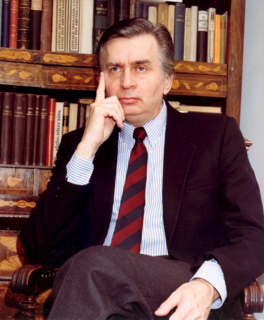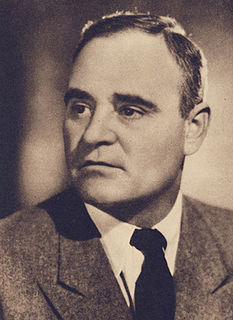
Bulgaria elects on national level a head of state - the president - and a legislature. The president is elected for a five-year term directly by the people. The National Assembly has 240 members, elected for a four-year term by proportional representation in multi-seat constituencies with a 4% threshold. Bulgaria has a multi-party system, in which no one party often has a chance of gaining power alone, and parties must work with each to form governments.

The National Assembly is the unicameral parliament and legislative body of the Republic of Bulgaria.
Parliamentary elections were held in Czechoslovakia on 26 May 1946. The Communist Party of Czechoslovakia emerged as the largest party, winning 114 of the 300 seats with 38% of the vote. This was the best performance for a Czechoslovak party up to that time; previously no Czechoslovak party had ever won more than 25 percent of the vote. Voter turnout was 93.9%. As it turned out, this was one of only two even partially free elections held in what would become the Eastern bloc, the other having been held in Hungary a year earlier. It would be the last free election held in Czechoslovakia until 1990.

Parliamentary elections were held in Macedonia on 18 October 1998, with a second round on 1 November. VMRO-DPMNE emerged as the largest party, winning 49 of the 120 seats, and later formed a coalition government with Democratic Alternative and the Democratic Party of Albanians.

Parliamentary elections were held in Hungary on 9 April 2006, with a second round of voting in 110 of the 176 single-member constituencies on 23 April. The Hungarian Socialist Party emerged as the largest party in the National Assembly with 186 of the 386 seats, and continued the coalition government with the Alliance of Free Democrats. It marked the first time a government had been re-elected since the end of Communist rule.

Parliamentary elections were held in Macedonia on 15 September 2002. The result was a victory for the Together for Macedonia, an alliance of the Social Democratic Union of Macedonia, the Liberal Democratic Party, the Democratic Party of Turks, the Democratic League of Bosniaks, the United Party of Romas in Macedonia, the Democratic Party of Serbs, the Democratic Union of Vlachs, the Workers-Peasant Party, the Socialist Christian Party of Macedonia and the Green Party of Macedonia, which won 60 of the 120 seats in the Assembly.

Parliamentary elections were held in Russia on 12 December 1993. They included the last elections to the Federation Council of Russia.

The 1990 Hungarian parliamentary elections were held in Hungary on 25 March 1990, with a second round of voting taking place in all but five single member constituencies on 8 April. They were the first completely free and competitive elections to be held in the country since 1945, and only the second free elections in the country's history. The conservative, nationalist Hungarian Democratic Forum (MDF) beat the liberal and more internationalist Alliance of Free Democrats, which had spearheaded opposition to Communist rule in 1989, to become the largest party in parliament. The Hungarian Socialist Party, the former Communist party, suffered a crushing defeat, winning only 33 seats for fourth place.

Constituent Assembly elections were held in Bulgaria between 1 and 30 January 1879, although only 117 of the 231 members of the Assembly were elected during this period. It followed the country's liberation from the Ottoman Empire, and saw the Conservative Party and the Liberal Party emerge as the two main parties. The Assembly was opened on 10 February, and convened in Veliko Tarnovo to ratify the country's first constitution, known as the Tarnovo Constitution, on 16 April. The parliament was later transferred to Sofia, which became the capital of the country.

Constitutional Assembly elections were held in Bulgaria on 27 October 1946. The elections served to elect members to the 6th Grand National Assembly, tasked with adopting a new constitution. The Fatherland Front, an anti-fascist coalition dominated by the Bulgarian Communist Party, had come to power in 1944 following a coup. Now that the Second World War was over and the monarchy abolished the communists wanted to adopt a new constitution. The Communists won a large majority, with 53.5 percent of the vote and 278 of the 465 seats. Voter turnout was 92.6%. This would be the lowest vote share that the Communists or the Fatherland Front would claim during the 43 years of undisguised Communist rule in Bulgaria. In subsequent years, the Fatherland Front would claim to win elections with unanimous or near-unanimous support.

Parliamentary elections were held in Bulgaria on 27 June 1971, the first held under the new Zhivkov Constitution, which had been approved in a referendum held a month earlier. The Fatherland Front, dominated by the Bulgarian Communist Party, was the only organisation to contest the election; all candidate lists had to be approved by the Front. The Front nominated one candidate for each constituency. Of the 400 candidates 268 were members of the Communist Party, 100 were members of the Bulgarian Agrarian National Union and the remaining 32 were unaffiliated. Voter turnout was reportedly 99.9%.
Elections for the Constituent Assembly were held in Denmark on 5 October 1848. Of the 158 seats in the Assembly, 114 were elected and 44 appointed by the King. An additional 31 candidates were to come from the Duchy of Schleswig but were not elected due to the First Schleswig War.

Parliamentary elections were held in Hungary between 31 March and 7 April 1935. The result was a victory for the Party of National Unity, which won 164 of the 245 seats in Parliament. Gyula Gömbös remained Prime Minister.

Parliamentary elections were held in Hungary on 8 June 1985. The Hungarian Socialist Workers' Party was the only party to contest the elections, and won 288 of the 387 seats, with 98 of the remaining 99 going to independents selected by the party, whilst one seat remained unfilled until the following year.

General elections were held in Romania in June 1939. The Chamber of Deputies was elected on 1 June, whilst the Senate was elected a day later. They were the first since the introduction of the royal dictatorship of King Carol II under the 1938 constitution. Voters were presented with a single list from the National Renaissance Front, which had been the only legally permitted party in Romania since December.

Parliamentary elections were held in Romania on 30 November 1952. They were the second held under undisguised Communist rule, and the first under a constitution adopted that September. Voters were presented with a single slate of candidates from the People's Democratic Front, which was dominated by the Romanian Workers Party. The Front won all 428 seats in the Great National Assembly. This election set the tone for all elections held in Romania until 1989. For the remainder of the Communist era, voters only had the choice of approving or rejecting a Communist-dominated list.

Parliamentary elections were held in Romania on 2 March 1969. The Front of Socialist Unity, which had been formed a year earlier to replace the People's Democratic Front, was the only organization that contested the election; no prospective candidate could run for office without the Front's approval. Like the People's Democratic Front, the Front of Socialist Unity was dominated by the Romanian Communist Party. The Front won all 465 seats in the Great National Assembly.

Parliamentary elections were held in Romania on 9 March 1975. The Front of Socialist Unity, dominated by the Romanian Communist Party and including other mass organisations, was the only organisation that contested the election. No prospective candidate could run for office without the Front's approval. The Front won all 349 seats in the Great National Assembly.

Parliamentary elections were held in Romania on 9 March 1980. The Front of Socialist Unity and Democracy, dominated by the Romanian Communist Party and including other mass organisations, was the only organisation that contested the election. No prospective candidate could run for office without the Front's approval. The Front won all 369 seats in the Great National Assembly.

Parliamentary elections were held in Romania on 17 March 1985. The Front of Socialist Unity, dominated by the Romanian Communist Party and including other mass organisations, was the only organisation that contested the election. No prospective candidate could run for office without the Front's approval. The Front won all 369 seats in the Great National Assembly. These would be the last single-party elections held in Romania; the Communists would be overthrown four years later.












